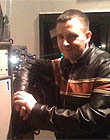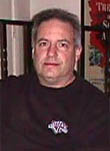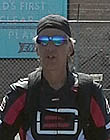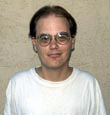|
|
 
|
|
Author
|
Topic: NPR piece on digital movies
|
|
|
|
|
Aaron Garman
Phenomenal Film Handler

Posts: 1470
From: Toledo, OH USA
Registered: Mar 2003
|
 posted 07-11-2012 03:31 PM
posted 07-11-2012 03:31 PM




Try this link
quote:
Warner Studios in Burbank, Calif., is a piece of American film history — remnants of sets from classics dot the lot: Casablanca, The Music Man, Tea for Two. Then there's the vault where film history lives.
For preservation purposes, the room is kept at a cool 38 degrees. Movable shelves stacked with thousands of steel film cases line the walls of the archive with movies and TV shows that go back as far as 1916. Many are major pieces of American film history — for example, the original camera negative of Rebel Without a Cause.
The contents of Warner's vault are increasingly becoming relics; the days of celluloid film are numbered. From the shooting process to the cinema projectors, the future is in digital. For movie studios, though, new technologies are often an excuse to go through their film libraries and re-release classics in the latest technology. But taking a film and moving it to digital, especially high definition, can change it. And some filmmakers aren't happy when studios do that.
Ned Price oversees the digital archives at Warner, a job that includes turning these films into high-definition digital copies for re-release. The digital transformation begins down the hall at the imaging lab. A laser scanner moves slowly across each frame of a film.
But "we can't literally copy a piece of film and have it look like it did in the theater," Price says. "So there's a bit of manipulation that has to go on."
YouTube
"A bit of manipulation" is an understatement. It can take months to make a digital copy look like the original film. Upstairs, there's a quiet editing room where Price is working on a high-definition 3-D version of Dial M for Murder. (Little-known fact: Alfred Hitchcock himself shot the 1954 film in 3-D originally).
The movie's famous murder scene happens in Grace Kelly's living room — all murky and shadowy at night.
The colorist working on the digital version at Warner, Janet Wilson, points out that in the initial digital copy, the room is dark — but the shadows aren't registering boldly.
"You can see that they're kind of blue and milky and washed out," she adds.
The colors have faded on the original film print, it turns out. But using digital coloring, Wilson is able to fix that.
"I isolate that element in the image, and I make it darker," Wilson says, "to make it actually look like a shadowy room."
The enhanced shadows make the room look much scarier. Hitchcock's ghost would approve — or at least Ned Price hopes so.
"We do check our backs once in a while," Price says. "There are a few filmmakers that you kind of wonder if they aren't ready to strike if you do the wrong thing."
To re-create Hitchcock's vision, they examine notes made by costume and lighting designers, and research the colors of film stock of the era. Price says directors are like painters: They make conscious choices about the color of furniture, wallpaper, costumes.
YouTube
But Price also admits high definition can change a film in a way the original director never dreamed of. In a classic like The Wizard of Oz, HD might get you a much brighter yellow brick road, but you might also see the strings attached to the flying monkeys.
"You're creating a hybrid," Price says. "You want to represent what the film's intent was, and what the look was, and what the feeling was of the film, but you want to take advantage of the fact that you can see a lot more."
But some moviemakers believe that movies made in film should be restored in film. Mary Sweeney, who worked for years with director David Lynch as an editor on features such as Mulholland Drive and Blue Velvet, asks us to imagine if they did this to a Rembrandt or Picasso.
"The fact that it converts from film to numbers shouldn't give people the right to toy with the work as it exists in history, as created by the people who made it."
Take Blue Velvet. Lynch's film, which explores the dark underbelly of a small town, opens with Bobby Vinton's sweet song "Blue Velvet" and bright shots of blue sky, manicured lawns and picket fences. Then its colors darken and actually get murky as the hero discovers the town's seedy underbelly.
"If they brightened up the scenes and the colors seemed sort of cheerier," Sweeney argues, the changes would affect the whole film.
"These are ways in which spectators just aren't conscious of how they are influenced by sound or color. But a filmmaker of David's caliber is very aware of that, very intentional in the way he uses it."
Blue Velvet has been re-released in high definition, but Lynch and members of the film crew were involved in the process. What worries Sweeney is that after Lynch is gone, and the technology keeps changing, the studio is likely to look for new ways to re-release his films using the latest technology.
"Someone sitting in an office in a studio thinking, 'How can I exploit our library' — those people are interested in the financial well-being of the studio," Sweeney says. They won't necessarily be interested in David Lynch's artistic vision.
Richard Donner, the director of Superman — the 1978 version with Christopher Reeve — doesn't think the issue is quite so fraught.
"It's not exactly like repainting a Rembrandt," he says. "It's not like a singular painting hanging in a museum. A lot of people would like to think that, and I have a lot of arguments with some of my fellow directors about it, but my feeling is we've turned it over to the public — hopefully they will handle it with respect."
Warner studios owns the rights to Donner's Superman. Donner was supposed to make the sequel, but had a fight with the studio. So when they released Superman in high definition — without his input — he was worried. Then he saw the results.
"Oh man, it looked beautiful," he says. "The blacks were stronger, and I saw some depth of focus that I didn't have before, and I was totally, totally impressed."
Digital film colorist Janet Wilson knows that it's a daunting task to re-create a director's work. But every year, she says, the technology is getting better. And about every five years, the studio revisits their most popular titles.
"There's going to be somebody else who will come behind me, who will maybe get this better," Wilson says, "who will get it more right than I was able to, who will have better tools."
Or maybe, Wilson says, she'll get another chance herself.
| IP: Logged
|
|
|
|
|
|
|
|
|
|
|
|
All times are Central (GMT -6:00)
|
|
Powered by Infopop Corporation
UBB.classicTM
6.3.1.2
The Film-Tech Forums are designed for various members related to the cinema industry to express their opinions, viewpoints and testimonials on various products, services and events based upon speculation, personal knowledge and factual information through use, therefore all views represented here allow no liability upon the publishers of this web site and the owners of said views assume no liability for any ill will resulting from these postings. The posts made here are for educational as well as entertainment purposes and as such anyone viewing this portion of the website must accept these views as statements of the author of that opinion
and agrees to release the authors from any and all liability.
|

 Home
Home
 Products
Products
 Store
Store
 Forum
Forum
 Warehouse
Warehouse
 Contact Us
Contact Us




 Printer-friendly view of this topic
Printer-friendly view of this topic













